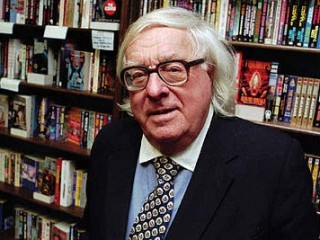
Ray Bradbury biography
Date of birth : 1920-08-22
Date of death : -
Birthplace : Waukegan, Illinois, U.S.
Nationality : American
Category : Arts and Entertainment
Last modified : 2010-08-25
Credited as : Horror-science fiction and mystery writer, wrote The Martian Chronicles,
3 votes so far
Early life
Ray Bradbury was born on August 22, 1920, in Waukegan, Illinois, to Leonard Spaulding Bradbury and Esther Marie (Moberg) Bradbury. His father was a lineman for the electric company. He was greatly influenced by his Aunt Neva, a costume designer and dressmaker, who took him to plays and encouraged him to use his imagination. At the age of twelve, after seeing the performance of a magician named Mr. Electrico at a carnival, Bradbury began to spend hours every day writing stories. Bradbury's family moved to Arizona briefly before settling in Los Angeles, California, in 1934. Bradbury continued to write and also spent a great deal of time reading in libraries and going to the movies.
Early career
After graduating from high school in 1938, Bradbury was turned down for military service because of bad eyesight. He earned a living selling newspapers while working on his writing. He sold his first story in 1943, and others were published in such magazines as Black Mask, Amazing Stories, and Weird Tales. Dark Carnival (1947) is a collection of Bradbury's early stories of fantasy (fiction with unusual plots and characters). Themes such as the need to retain human values and the importance of the imagination are found in these stories. Many of these pieces were republished with new material in The October Country (1955).
The publication of The Martian Chronicles (1950), an account of man's colonization of Mars, established Bradbury's reputation as an author of quality science fiction. The Martian Chronicles contain tales of space travel and adapting to an environment, and combines many of Bradbury's major themes, including the conflict between individual and social expectations (that is, freedom versus confinement and going along with the crowd) and the idea of space as a frontier wilderness. The Martian Chronicles also reflects many issues of the post-World War II era, such as racism (unequal treatment based on race), censorship (preventing the viewing of materials such as books or films that are considered harmful), and the threat of nuclear war. In another collection of short stories, The Illustrated Man (1951), the stories are based on the tattoos of the title character.
Other works
Bradbury's later short story collections were not as well received as his earlier work. Although Bradbury used many of the same methods in writing these stories as in his science fiction works, he shifted his focus from outer space to more familiar earthbound settings. Dandelion Wine (1957), for example, has as its main subject the midwestern youth of Bradbury's main character, Douglas Spaulding. Other collections include A Medicine for Melancholy (1959), The Machineries of Joy (1964), I Sing the Body Electric! (1969), and Long after Midnight (1976). Many of Bradbury's stories have been filmed for science fiction television programs such as The Twilight Zone and Alfred Hitchcock Presents.
Bradbury also wrote several adult novels. The first of these, Fahrenheit 451 (1953), concerns a future society in which books are burned because they are perceived as threats to social order. In Something Wicked This Way Comes (1962) a father attempts to save his son and a friend from the evil forces of a mysterious traveling carnival. Both of these novels were made into films. Death Is a Lonely Business (1985) is a detective story featuring Douglas Spaulding, the main character of Dandelion Wine, as a struggling magazine writer.
Still active
Over the past five decades Bradbury has managed to produce a tremendous amount of different kinds of work, including short stories, plays, novels, film scripts, poems, children's books, and nonfiction. He gives the credit to the steady writing routine that he has followed every day for fifty years. He also claims to remember everything about every book he has read and every film he has seen.
Bradbury also uses an unusual method of writing. In Extrapolation William F. Touponce quotes Bradbury saying: "In my early twenties I floundered into a word-association process in which I simply got out of bed each morning, walked to my desk, and put down any word or series of words that happened along in my head." Bradbury suffered a stroke in November 1999 but recovered. In November 2000 he received a National Book Award for lifetime achievement. Bradbury published a new novel, From the Dust Returned, in 2001.
















